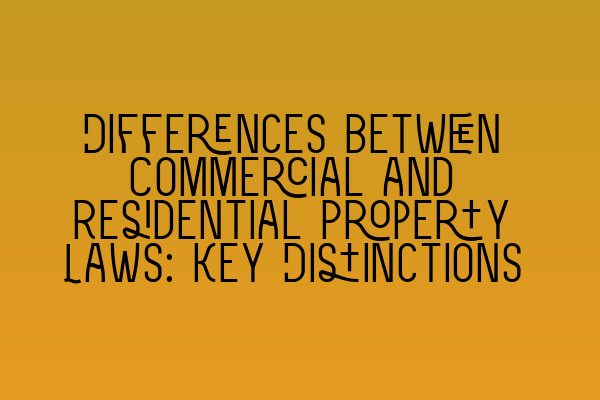Differences between Commercial and Residential Property Laws: Key Distinctions
As a solicitor specializing in property law, it is important to understand the differences between commercial and residential property laws. While both may involve the buying, selling, and leasing of properties, there are key distinctions that must be recognized. In this blog post, we will explore these differences, helping you gain a comprehensive understanding of the unique legal aspects associated with commercial and residential properties.
1. Purpose of Property
One of the primary distinctions between commercial and residential properties is their purpose. Commercial properties are used for business activities, such as offices, retail stores, warehouses, and industrial facilities. On the other hand, residential properties are specifically designed for people to live in, including houses, apartments, and condominiums. Understanding the purpose of the property is crucial as it sets the foundation for the respective property laws that govern them.
2. Lease Agreements and Tenancies
Commercial leases tend to be more complex and extensive compared to residential leases. Commercial lease agreements usually involve longer terms, ranging from 5 to 20 years, with detailed clauses addressing rent increases, maintenance responsibilities, insurance requirements, and even potential business restrictions. Residential leases, however, are generally shorter-term agreements, typically lasting for 6 or 12 months, and focus more on basic tenant rights and obligations.
3. Regulations and Legal Framework
Commercial properties are subject to more rigorous regulations and legal frameworks when compared to residential properties. This is because commercial properties often involve multiple parties, such as landlords, tenants, businesses, lenders, and government authorities. Compliance with zoning regulations, planning permissions, health and safety codes, and environmental regulations are critical considerations in commercial property transactions. Residential properties, while still subject to regulations, tend to have a less complex legal framework due to their primary purpose of providing housing.
4. Property Ownership
The ownership of commercial and residential properties also differs. Commercial properties are commonly owned by corporate bodies, partnerships, or individuals acting as investors or business entities. In contrast, residential properties are typically owned by individuals or families for personal use or as an investment for rental income. Understanding the ownership structure is essential in navigating the legal intricacies associated with each type of property.
5. Taxation
Taxation varies significantly between commercial and residential properties. Commercial properties are often subject to additional taxes, such as business rates and Value Added Tax (VAT). Additionally, capital gains tax may apply when selling a commercial property. Residential properties, on the other hand, may be subject to stamp duty land tax upon purchase and capital gains tax when sold, but do not generally have the same level of additional taxes as commercial properties. Being aware of the tax implications is crucial when advising clients on property transactions.
6. Dispute Resolution
Dispute resolution processes also differ between commercial and residential properties. Commercial property disputes often involve complex contractual issues and may be resolved through alternative dispute resolution methods such as arbitration or mediation. In contrast, residential property disputes usually revolve around tenancy agreements or property maintenance issues and may be tackled through the courts or, in some cases, through the residential tenancies dispute resolution services provided by local authorities.
In conclusion, understanding the key distinctions between commercial and residential property laws is essential for solicitors specializing in property law. The purpose of the property, lease agreements, regulations and legal frameworks, property ownership, taxation, and dispute resolution processes all play a significant role in determining the legal aspects associated with each type of property. By having a thorough understanding of these differences, solicitors can provide expert guidance to their clients based on their specific property needs.
For more information on property law, or to enhance your knowledge and skills in preparation for the SQE exams, we recommend checking out our related articles:
– SQE 1 Practice Exam Questions
– SQE 1 Practice Mocks FLK1 FLK2
– SQE 2 Preparation Courses
– SQE 1 Preparation Courses
– SRA SQE Exam Dates
At SQE Property Law & Land Law, we provide comprehensive training and resources to help you excel in your legal career. Whether you are preparing for the SQE exams or seeking professional development, our team of experts is here to support you every step of the way. Feel free to reach out to us for further assistance or to inquire about our services.
